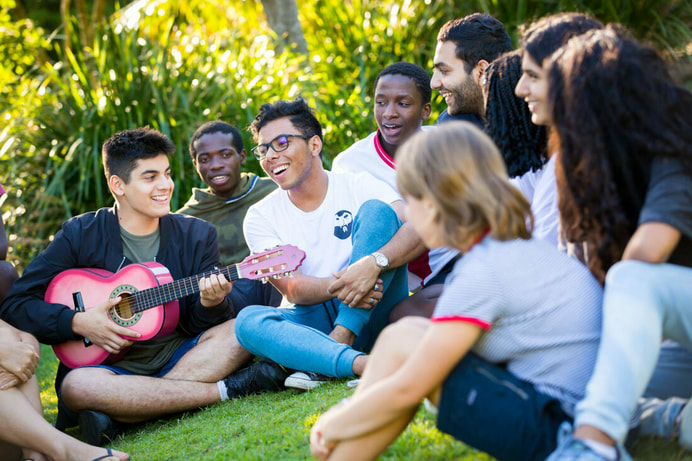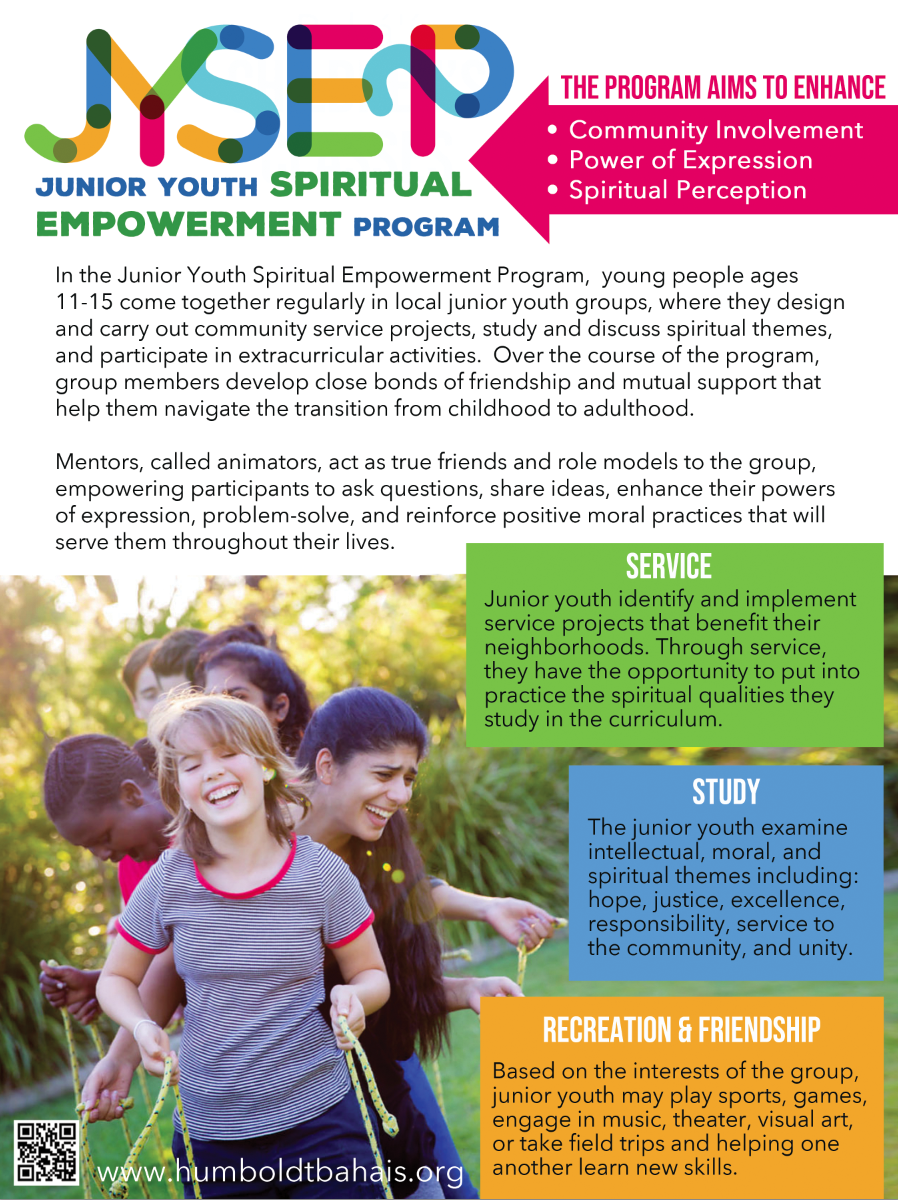Combining study, friendship, and social action.
The Junior Youth Spiritual Empowerment Program typically engages older youth as animators of younger peers, aged 11-15, to help them develop their powers of expression, capacity for moral reasoning, and an ethic of service to others.
|
ELEMENTS
Junior youth groups meet once a week, though sometimes more, typically over a three year period and study materials that have been specifically developed for ages between 11 and 15. Studying occupies only a portion of the time the junior youth spend together. During the rest of the time, groups consult on and plan service projects, participate in sports, and engage in cultural activities, such as drama and crafts, suited to their immediate surroundings. In addition to these weekly meetings, groups attend special events and undertake acts of service to the community. |
ENVIRONMENT
The group offers a space in which the junior youth can develop patterns of thought and behavior that will characterize them throughout their lives and understand the world around them. The atmosphere of these groups strives to be joyous and friendly where the junior youth can enhance those qualities and attributes that a life of service to humanity requires. In such a setting, the members of the group, free from the fear of criticism or ridicule, can express their thoughts on complex questions. They learn to listen, to speak, to reflect, to analyze, to make decisions, and to act on them. |
Become an Animator
Older youth around the world are recognizing the significant role they can play in the lives of those younger than themselves. They are called animators and serve as trained facilitators for groups.
What is an animator?
We call facilitators of junior youth groups 'animators' because their role is to bring joy and life into the activities of the group. An animator serves as a true friend and wise advisor to the junior youth, and is careful to not act in a paternalistic way. Animators must relate to the junior youth not as children, but as young people with capacity and a growing ability to contribute to building a new society. The group must foster conditions that inspire service to the community, while making sure that an attitude of self-centeredness is not evoked. Their interactions with the parents of the junior youth must nurture a collaborative spirit and attempt to extend the positive environment of the group into the home and community.
The effect of the program on the animators has been equally significant. Many find that the concepts and conversations they hold with the junior youth inspire them to lead a more integrated and joyful life. Animators find that as they grow in their own ability to reflect noble qualities and live principles of justice, honesty, and love, the effectiveness of their service increases.
Qualities of an animator
Typically an animator is an older youth, aged 15-30, but it is not limited to that age group. However, junior youth tend to look up to youth and repeat behaviors of those youth they see around them. Since youth are closest to that stage of life they can relate to a lot of the feelings, problems and emotions that the junior youth are experiencing and likely have practical tools to work through circumstances that may arise.
An effective facilitator of these groups is patient and willing to treat the junior youth with the same kindness, respect and love which they would treat someone their same age. Animators are careful to not treat them as less important or less valuable than an adult member of society.
It is important to have confidence to facilitate group discussions and the flexibility to incorporate the ideas and desires of all the group members. Humility is needed to engage in a process of community development characterized by action, reflection, consultation and research. It is important to be consistent with attendance to the junior youth group as the junior youth, their families and the other facilitator you are working with rely on you to be there.
How to become an animator
In order to become an animator, you participate in a training geared to build capacity to work with junior youth. The training focuses on personal growth and looks at the potential of this age group, the important and unique role of an animator, and some practical skills, such as lesson planning, encouraging desirable behavior, and establishing bonds of friendship with parents of junior youth.
Animators are accompanied to start new groups and are helped during the group's first few meetings by program coordinators or experienced animators. They also participate in periodic gatherings of animators to receive continual support and work together to enhance the overall program.
We call facilitators of junior youth groups 'animators' because their role is to bring joy and life into the activities of the group. An animator serves as a true friend and wise advisor to the junior youth, and is careful to not act in a paternalistic way. Animators must relate to the junior youth not as children, but as young people with capacity and a growing ability to contribute to building a new society. The group must foster conditions that inspire service to the community, while making sure that an attitude of self-centeredness is not evoked. Their interactions with the parents of the junior youth must nurture a collaborative spirit and attempt to extend the positive environment of the group into the home and community.
The effect of the program on the animators has been equally significant. Many find that the concepts and conversations they hold with the junior youth inspire them to lead a more integrated and joyful life. Animators find that as they grow in their own ability to reflect noble qualities and live principles of justice, honesty, and love, the effectiveness of their service increases.
Qualities of an animator
Typically an animator is an older youth, aged 15-30, but it is not limited to that age group. However, junior youth tend to look up to youth and repeat behaviors of those youth they see around them. Since youth are closest to that stage of life they can relate to a lot of the feelings, problems and emotions that the junior youth are experiencing and likely have practical tools to work through circumstances that may arise.
An effective facilitator of these groups is patient and willing to treat the junior youth with the same kindness, respect and love which they would treat someone their same age. Animators are careful to not treat them as less important or less valuable than an adult member of society.
It is important to have confidence to facilitate group discussions and the flexibility to incorporate the ideas and desires of all the group members. Humility is needed to engage in a process of community development characterized by action, reflection, consultation and research. It is important to be consistent with attendance to the junior youth group as the junior youth, their families and the other facilitator you are working with rely on you to be there.
How to become an animator
In order to become an animator, you participate in a training geared to build capacity to work with junior youth. The training focuses on personal growth and looks at the potential of this age group, the important and unique role of an animator, and some practical skills, such as lesson planning, encouraging desirable behavior, and establishing bonds of friendship with parents of junior youth.
Animators are accompanied to start new groups and are helped during the group's first few meetings by program coordinators or experienced animators. They also participate in periodic gatherings of animators to receive continual support and work together to enhance the overall program.
"No society can experience the spiritual and social advancement possible at this stage of human life without the selfless service of its members..."
JYSEP groups are forming in Humboldt. Contact us for more information on how you can get involved.
|
In neighborhoods across the country, Bahá’is and their friends are engaged in a community building process that cultivates love and translates it into action.
|
The Bahá’í Faith is established in more than 100,000 localities in virtually every country & territory around the world.
|




